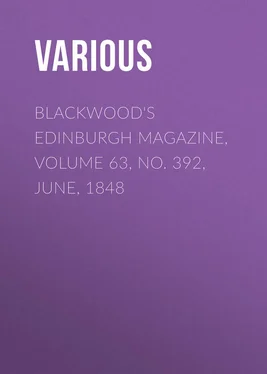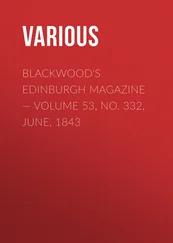Various - Blackwood's Edinburgh Magazine, Volume 63, No. 392, June, 1848
Здесь есть возможность читать онлайн «Various - Blackwood's Edinburgh Magazine, Volume 63, No. 392, June, 1848» — ознакомительный отрывок электронной книги совершенно бесплатно, а после прочтения отрывка купить полную версию. В некоторых случаях можно слушать аудио, скачать через торрент в формате fb2 и присутствует краткое содержание. Издательство: Иностранный паблик, Жанр: periodic, foreign_edu, Путешествия и география, на английском языке. Описание произведения, (предисловие) а так же отзывы посетителей доступны на портале библиотеки ЛибКат.
- Название:Blackwood's Edinburgh Magazine, Volume 63, No. 392, June, 1848
- Автор:
- Издательство:Иностранный паблик
- Жанр:
- Год:неизвестен
- ISBN:нет данных
- Рейтинг книги:4 / 5. Голосов: 1
-
Избранное:Добавить в избранное
- Отзывы:
-
Ваша оценка:
- 80
- 1
- 2
- 3
- 4
- 5
Blackwood's Edinburgh Magazine, Volume 63, No. 392, June, 1848: краткое содержание, описание и аннотация
Предлагаем к чтению аннотацию, описание, краткое содержание или предисловие (зависит от того, что написал сам автор книги «Blackwood's Edinburgh Magazine, Volume 63, No. 392, June, 1848»). Если вы не нашли необходимую информацию о книге — напишите в комментариях, мы постараемся отыскать её.
Blackwood's Edinburgh Magazine, Volume 63, No. 392, June, 1848 — читать онлайн ознакомительный отрывок
Ниже представлен текст книги, разбитый по страницам. Система сохранения места последней прочитанной страницы, позволяет с удобством читать онлайн бесплатно книгу «Blackwood's Edinburgh Magazine, Volume 63, No. 392, June, 1848», без необходимости каждый раз заново искать на чём Вы остановились. Поставьте закладку, и сможете в любой момент перейти на страницу, на которой закончили чтение.
Интервал:
Закладка:
The first thing which is indispensably necessary towards the restoration of confidence and enterprise in the moneyed classes, and consequent employment and happiness in the poor, is to repeal the Bank Charter Acts of 1844 and 1845; and in lieu thereof to establish such a system as may provide a safe, sufficient, and equable circulation for the empire. Above all, it is necessary to establish a circulation which shall be capable of expanding , instead of contracting , as specie is drawn out of the country. This is the one thing needful. Till this is done, every attempt to alleviate the existing misery, in a durable way, will prove abortive. Nobody wants to have French assignats issued amongst us, or to have every insolvent who chooses to call himself a banker authorised to issue currency ad libitum , and substantially usurp the Queen's prerogative by coining worthless paper into doubtful money. But as little can the nation go on longer with our circulation based exclusively on gold coin, and liable to be contracted as that coin is drawn out of the country; thereby doubling the evil , by first inducing speculation when specie is plentiful, and then withdrawing the currency when it becomes scarce. Still less can this be borne, when a system of free-trade has been established amongst us which has enormously increased our importations, especially in articles of food and rude produce, for which experience proves nothing but cash will be taken by the holders; and which, in consequence, has induced a consequent tendency outward in the precious metals, from which, if no corresponding increase in domestic circulation is permitted, nothing but contraction to credit stoppage to speculation, and ruin to industry is to be anticipated. Least of all can such a system of drawing in paper as the gold goes out, be endured when political circumstances have so much increased the demand for the precious metals in the neighbouring states; when the revolutions in France and Germany have at once rendered hoarding general in those countries, and deluged us with their bankrupt stocks, for which nothing but specie will be taken in exchange; and when the commencement of hostilities, both in Italy and Germany, has occasioned the usual demand for gold, as the most portable of the precious metals, to meet the necessities of war.
The way in which the dreadful evils consequent upon commercial credit, and consequently universal employment, being kept dependent on such an unstable equilibrium as that which gold must ever, and most of all in such circumstances, afford, is perfectly evident. What is wanted is something to equalise the supply of currency ; to contract paper when the precious metals are abundant, and, consequently, credit is becoming dangerously expansive, and to expand it when they are withdrawn, and, consequently, credit is in danger of being ruinously contracted. Sir R. Peel's system does just the reverse of this: it pours paper in profusion through the country, and consequently fosters absurd and improvident speculation, when specie is abundant, and draws it in suddenly, and with frightful rapidity, the moment that the precious metals begin to be withdrawn, either from the effect of extended importations or foreign warfare. To go right, and obviate the dreadful evils which their system has introduced, we have nothing to do but to establish a monetary policy precisely the reverse . What is wanted is a sliding scale for paper-money , – a system which shall tend to contract paper issues when specie is abundant, and pour them forth with restorative and beneficial vigour the moment that it begins to disappear. Thus, and thus alone, it was that Mr Pitt enabled the country to combat the dangers and surmount the difficulties of the revolutionary war. 9 9 Bank of England notes in circulation, — – Alison's England in 1815 and 1845, Appendix.
Under Sir R. Peel's system, the nation, and every one in it, would have been bankrupt when the bank stopped payment in 1797, and we should long ere this have been irrecoverably rendered a province of France.
It belongs to practical men, versed in the mysteries of Lombard Street and the Stock Exchange, to say how this important object is to be attained with due attention to the security of the notes issued, and sufficient safeguards against an over-issue, and consequent injury to capital, by an undue rise of prices owing to that cause. That the thing is possible is self-evident. It appears to be essential to such a system that one of two things should be done. Either that the issuing of notes should be left to all banks, under the limitation that private banks should be obliged to take up their notes at all times, – in Bank of England paper or gold or silver – and deposit government securities to the extent of the notes so issued, to be appropriated to their payment in case of bankruptcy; and that the Bank of England should be bound to pay its notes in gold or silver , at the price those metals bear at the time of presentment . Or , that the issuing of notes, like the coining of money, should be confined entirely to government or its officers; and that the regulation of their amount should be entrusted to certain elevated functionaries – like the commissioners of the national debt – with instructions to them to regulate their issues by the price of gold and silver, increasing them when the rise in the value of those metals showed that they were leaving the country, and contracting them when the price fell, and it was evident that the necessity for an extended paper circulation was passing away.
Of course it would be necessary, under such a system, to impose some limit to the obligation of the Bank of England to pay in specie; but this might be done either by obliging that establishment to pay in either of those metals at the current price they bore in the market at the date of presentment, or by providing, that beyond a certain amount of notes payable on demand, as £40,000,000 for Great Britain, and Ireland, notes of a different colour , as red, should be issued, which were exchangeable for specie only when the precious metals had again fallen to a certain price in the market. These notes should be issued when gold rises to a certain price, and is evidently leaving the country – just as grain from government stores should be issued to the people in periods of scarcity – and drawn in when it returns, and the price falls. We throw these out only as crude suggestions, which may or may not be adequate to answer the purpose in view. What we rest upon, and press in the most earnest manner upon the consideration of the country, is the absolute necessity of altering the present system of contracting the paper when the gold is taken away – in other words, limiting the issues of bread when the beef fails – and substituting for it one of extending the issue of paper when the precious metals are withdrawn; in other words, increasing the issues of bread when those of beef have become deficient .
The next measure which appears indispensable to secure internal tranquillity in the empire is, to make a very considerable government grant, to enable the railway companies to complete the principal lines now on foot, but still in an unfinished state. Every consideration of justice, expedience, and necessity, calls for such a grant. Many of these railways can be completed in no other way. Their directors have already borrowed all the money on the security of the undertaking which the law allows (a third;) and the diminished means and straitened credit of the shareholders, for the present at least, has disabled them from answering any further calls. The works must stand still, a deformity and a disgrace to the country, if government relief is not afforded. Parliament has declared the expedience of these lines by having passed the bills for their formation. Most, perhaps all, of these would have been completed ere this, had not the fetters imposed on the currency by the Bank Charter Act so straitened credit that it has become impossible. The very name of government being willing to advance a certain sum, as two or three millions, to enable these companies to resume their work, would so restore and vivify credit, that it is probable a very small part of the sum voted would be taken up by these undertakings. The restoration of private credit, by such a measure on the part of government, would unlock the immense coffers of wealth which now, from the prostration of private credit, lie unemployed in the country. For, such is the strange and anomalous condition in which we stand, that while our streets are crowded with thousands and hundreds of thousands of unemployed labourers and artisans seeking employment, our banks and insurance offices are crowded with thousands and hundreds of thousands of unemployed capital seeking investment. Yet these two superfluities cannot reach or relieve each other. Why? Because credit and currency are wanting to enable the one to pass over to the other. Let government lay the foundation of the bridge, and the communication, to mutual advantage, will soon be restored.
Читать дальшеИнтервал:
Закладка:
Похожие книги на «Blackwood's Edinburgh Magazine, Volume 63, No. 392, June, 1848»
Представляем Вашему вниманию похожие книги на «Blackwood's Edinburgh Magazine, Volume 63, No. 392, June, 1848» списком для выбора. Мы отобрали схожую по названию и смыслу литературу в надежде предоставить читателям больше вариантов отыскать новые, интересные, ещё непрочитанные произведения.
Обсуждение, отзывы о книге «Blackwood's Edinburgh Magazine, Volume 63, No. 392, June, 1848» и просто собственные мнения читателей. Оставьте ваши комментарии, напишите, что Вы думаете о произведении, его смысле или главных героях. Укажите что конкретно понравилось, а что нет, и почему Вы так считаете.












